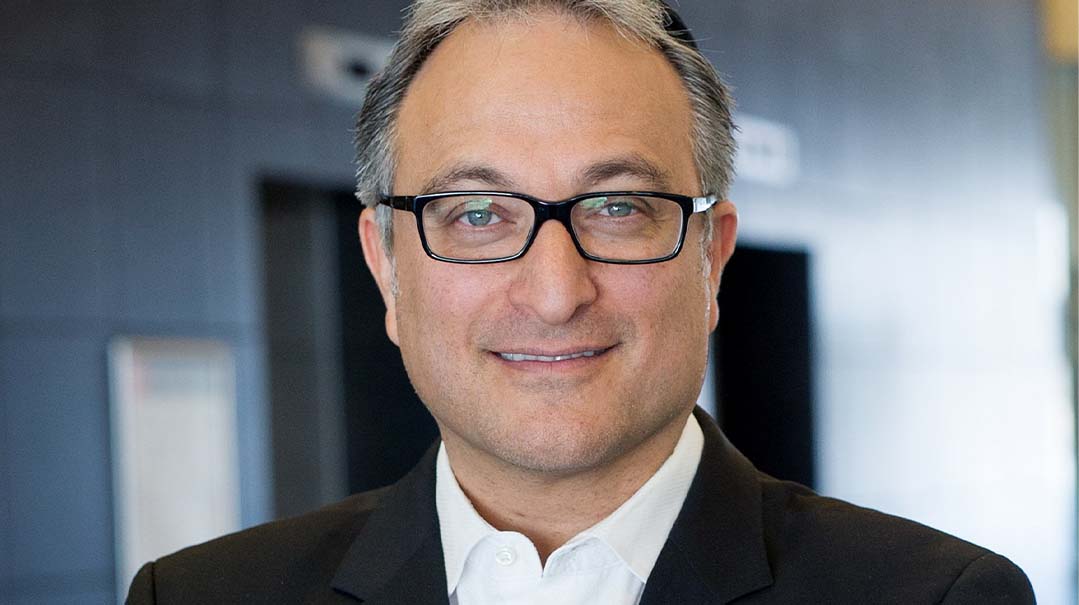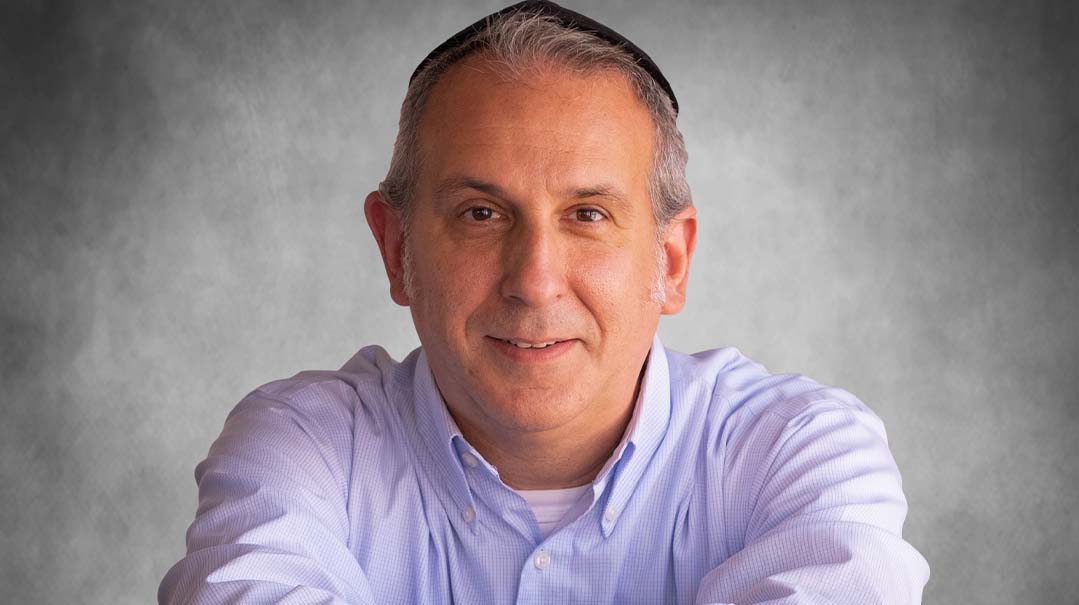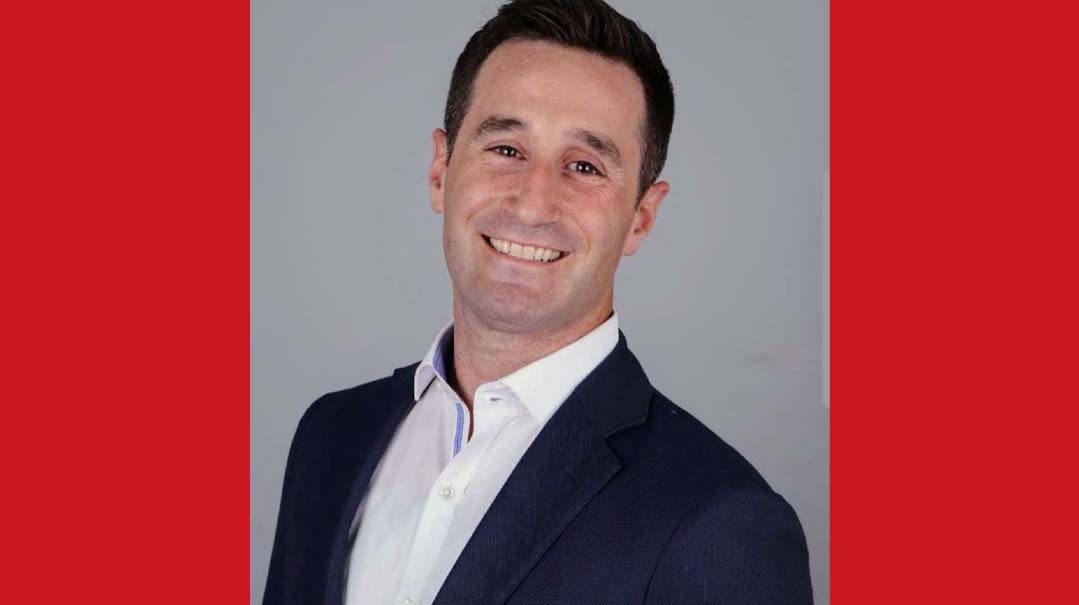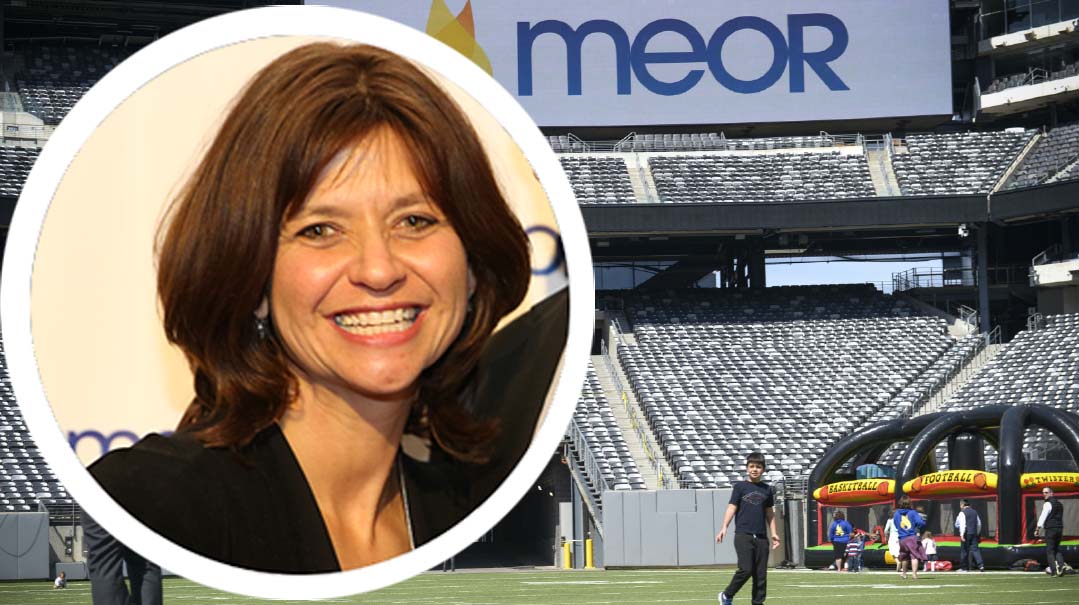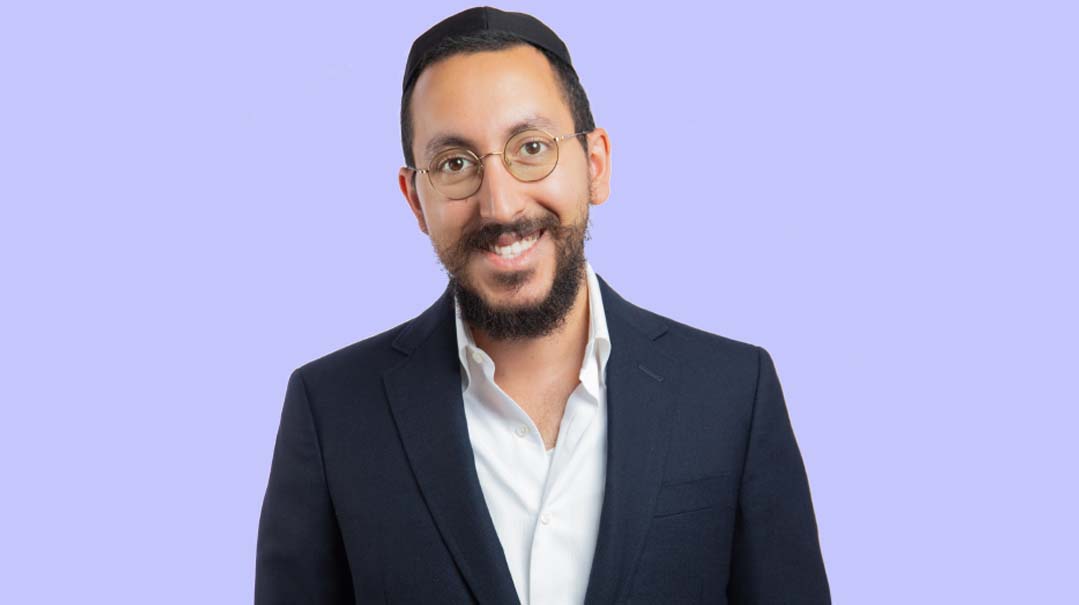Work/Life solutions with Moe Mernick

As we wrap up this column (for now), the team at Mishpacha felt that the best possible candidate for a final interview would be me
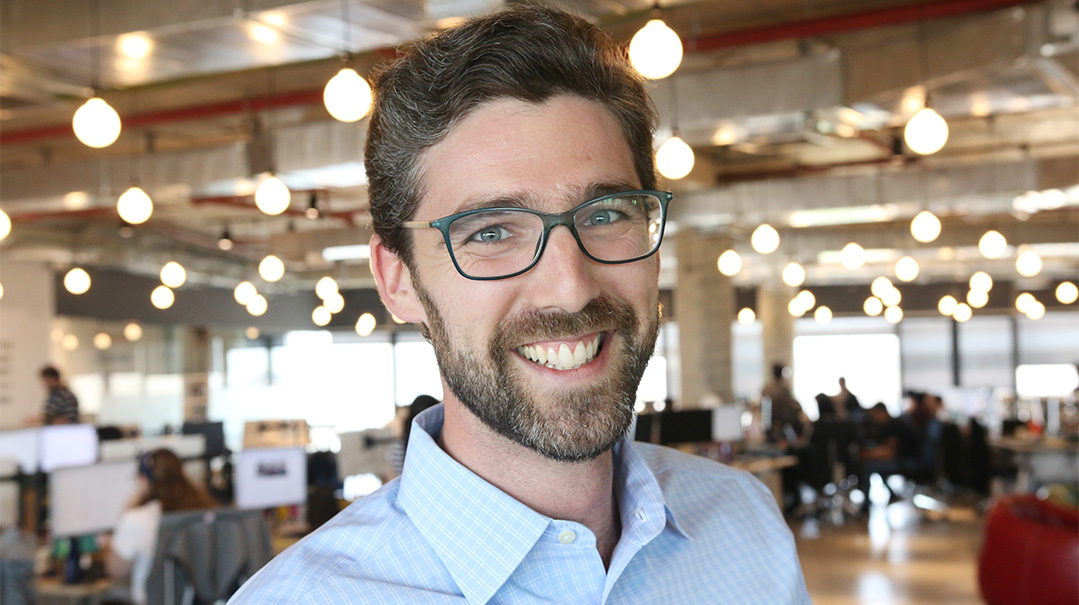
Who: Moe Mernick (It’s me, the author of this column.) I run operations at Triple Whale (a high-growth tech start-up), give a daily daf yomi shiur, and produce a short, inspiring video on each daf.
What: About eight months ago, I began working at Triple Whale, a high-growth technology start-up that provides an operating system that empowers e-commerce brands to grow their businesses. Launched just over a year ago, the company already onboarded more than 4,000 customers, raised over $27 million, and provides analytics on $9.5 billion in gross merchandise value. Prior to joining Triple Whale, I worked at various technology companies, ran my own start-up, and spent a number of years working for various kiruv organizations. I also hold an international MBA from Tel Aviv University and semichah from Rav Zalman Nechemia Goldberg.
Where: I was born and raised in Toronto, but haven’t spent much time there since I was 15. I learned in yeshivos in Eretz Yisrael and America, then spent time in Europe, Australia, and various cities in North America working for various organizations. About ten years ago, my wife, kids, and I were blessed with the opportunity to move to Eretz Yisrael, and we’ve spent most of that time living in Ramat Beit Shemesh.
Why: Over the last four years, it has been an honor and privilege to take this 5 to 9 journey together. Through the prism of other people’s inspiring stories and insights, we’ve been able to push the boundaries of growth in our personal, spiritual, and business lives. Thank you for taking the time to read, to question, and to comment. It’s been the greatest privilege to grow together with you.
The most common question I’ve been asked throughout this period of time is: How would you answer these 5 to 9 questions? So, as we wrap up this column (for now), the team at Mishpacha felt that the best possible candidate for a final interview would be me.
1 of 9 What opportunities or personalities played a key role in your career path?
Yesterday, at shul, a new guy walked in, looked around, and broke out into a smile as he noticed me. He came over to me and exclaimed, “I babysat you when you were a kid!”
Well, that certainly piqued my curiosity, and I went over to him after davening was over. He told me that he used to come over to my house on Shabbos all the time. I wasn’t surprised; my parents hosted countless people when I was younger.
“Tell me a story,” I asked. My father passed away about six months ago, so I’ve been trying to collect stories about his lifetime.
“I’ve got something for you,” he enthusiastically responded. “I’ll tell you the speech that your dad said over at your bris.” Now he definitely had me hooked.
“Your dad shared his dream of becoming a doctor. But as a Kohein, he was unable to go to medical school (because of the work done on cadavers). So he went to Rav Moshe Feinstein for advice.
“ ‘Why do you want to become a doctor?’ Reb Moshe asked him.
“So your dad responded, ‘I want to save people’s lives.’
“Reb Moshe then gave your father life-changing advice: ‘If you want to save people’s lives, you should save people’s souls — you should go into kiruv!’ ”
At the bris, my parents named me Moshe (Moe is short for Moshe), after the gadol hador who had recently passed away.
This story about my father reflects my lifelong dream: I want to help others lead happier, more meaningful lives. I want to make a positive impact on the world. And one of my big role models, though perhaps subconsciously, was my father.
He was one of the foremost activists spearheading a kiruv movement in the ’70s and ’80s, before that term became popular. He’d fly around the world, meeting with dignitaries, leading rabbis, and community leaders, ensuring secular Jewish students had opportunities to learn in yeshivos and seminaries. He’d travel to far-flung communities to connect with local Jewish students and encourage them to learn for a couple months in Israel — and often pay out-of-pocket for their flights and tuition.
He’d also attend all kinds of Jewish programming, frum and non-frum alike, to ensure that he’d be able to expose the Jewish students to authentic Torah (and delicious cholent!). At one particular shabbaton, in a small town in Canada, he composed the hit song “Shivti,” which went on to become one of the most popular Jewish tunes of all times. Many people still refer to him as “Shivti Mernick”!
Countless people, including some of the most prolific rabbis and educators of our generation, have told me that they’re frum today because of the impact my father had on their lives when they were younger.
But while kiruv was my father’s passion, he was an active businessman determined to be financially independent, and often used his own money to support his kiruv projects.
My father’s example inspired me, and already as a child, I knew what I wanted to do long term: invest my life into helping other Jews see the beauty, depth, and relevance of Torah, while independently supporting myself through business endeavors.
But it took me time to figure out how to juggle both worlds. After a couple of years in yeshivah, I took some time to fully invest myself in kiruv in various locations spanning Europe, Australia, and various cities across North America. I taught Torah to secular students, created informal educational programming, and worked toward building a more sustainable educational infrastructure. My wife also had teaching experience and a tremendous amount of passion for kiruv, so we spent much of our shanah rishonah in Vancouver, Canada: I was the NCSY director and youth rabbi, and she taught at a few local schools.
Being fully involved in kiruv was rewarding, but I knew I wanted to transition my “career” into business. I enrolled in Tel Aviv University to study for my MBA while my wife was the eim bayit at a kiruv-focused gap year program at Bar-Ilan University, giving us the opportunity to continue to teach, both formally and informally. And this vision has helped shape my career trajectory over the last decade.
These days, in addition to my (very!) full-time job at a tech start-up, I’m also quite involved in the broader Jewish community. I teach an early-morning daf yomi shiur at KSY in Ramat Beit Shemesh, create a daily short, inspirational video (shared via WhatsApp, TorahAnytime, and AllDaf), mentor Jewish nonprofits, and sporadically teach for various kiruv organizations.
It’s super busy. Quite exhausting, actually. But it’s also beyond meaningful and exhilarating to be living my dream of making a positive impact on the Jewish world, the mission I inherited from my father.
3 of 9 What do you do to relax, recharge, or simply have fun? How do you make time for that, and how often?
I wasn’t going to answer this question. But recently, as I’ve seen so many people I know suffer in a variety of ways through Covid and lockdowns, I’d like to share something so simple, yet so profound. Ready for this?
We must take care of ourselves.
That’s all. Simple, right? Wrong. So many of us don’t. Whether it’s working 80-hour weeks, being too busy to exercise, or simply not eating healthfully, many of us are running ourselves down. And that’s simply not what Hashem wants from us.
I’ve begun to prioritize eating healthier, sleeping better, and exercising regularly. These habits make a world of a difference. In addition, it’s critical to carve out quality time for the important people in our lives, get regular guidance from a rabbi, mentor, and/or therapist, and ensure we’re constantly growing spiritually.
This sounds idyllic, but there aren’t enough hours in the day, right? And can we possibly prioritize these seemingly excess pleasures when we have so much existing pressure on our time (between family, learning, davening, community, and work)?
I can relate. But it’s so important. Give it a shot. Write down your priorities, create a calendar, and shave off activities that don’t feed into leading your best life. And pray.
4 of 9 What would you say was your most resounding failure? What did you take away from that experience?
We glorify success, and we often fall into the trap of only speaking about failure after-the-fact. We may also subconsciously glorify those with pompous professional titles, regardless of what they’re actually doing at work, whether they’re balancing other areas of their lives, and regardless of their level of happiness.
That’s not helpful. We need honest, open, and vulnerable role models, not just those who seem untouchable.
This is one of the reasons I started this column — and why I included this question. Selfishly, I wanted to learn from people who seemed to be juggling both worlds. While some were more financially successful than others, they were all, in their own unique way, trying to succeed in both their business and Torah-oriented endeavors.
And this question was always fascinating to unpack. I encouraged interviewees to open up and be vulnerable, because that’s where the readers often connected most to the content.
On a personal note, I’d like to share with you a big business failure and how it shaped my subsequent steps in business.
Four years ago, I was running a huge business initiative for my company that was generating millions of dollars in revenue. I analyzed the market and decided that if I spun out that initiative into an independent start-up, I could create a stand-alone opportunity that could do even better. After months of research and conversations with my network, my CEO (along with other investors) decided to fund my new start-up idea.
All of a sudden, I became a “founder and CEO” of a start-up, a coveted LinkedIn title and bio headline. From the outside, it seemed glorious, but from the inside, it was less so. I was the only staff member in the company, which meant I was responsible for everything. From overseeing outsourced software development and design, to onboarding new customers and partners, to overseeing the minutiae of legal and accounting…it was beyond stressful.
Nearly a year into the endeavor, even though the company was gaining traction and growing, the markets were changing, and my ultimate vision for success was looking less likely. I was at a crossroads. Should I raise more capital (from an interested investor) or shift back into something that felt more right?
Shutting down the business would mean that I’d lose 100% of the capital that was already invested. It would mean declaring total failure. And at that point, I was already mentoring other start-ups and speaking in public at business conferences. How would it come across if I failed like that? Inasmuch as we seem to praise failure as a part of one’s journey, actually, failing is rough… especially with a growing family to support and the discomfort of facing investors empty-handed.
But deep down, I knew what was right. (And I strongly believe that we all usually know what is right, if we can peel away layers and be in touch with our inner selves.) Even if I raised more money, I wasn’t as confident (as when I started) in the business’s ability to ultimately succeed, especially with the outsized returns that venture capitalists expect. So even though it may have been more comfortable to stay in that role and continue getting a paycheck, the right thing to do was to shut down the company.
And so I did.
I have no happily-ever-after epilogue. The experience is still raw. There’s no glamorous end (at least not yet). Instead, I’d like to take this opportunity to encourage you to think deeply about what you really want to do… and not what you think others want you to do, what would look good on social media, or what wouldn’t work for your family and other important areas of your life.
People often ask me for advice on starting a business. And I usually discourage it. Launching a business can be the right opportunity for certain people, at certain times. However, for many other people, it’s not. And that’s more than okay. There’s room to gain professional experience, be entrepreneurial, and make some money — without being the “founder and CEO” of a company.

Shutting down my business was one of the most painful decisions I’d made — how could I remain a business mentor and speaker if I had failed at my own venture? But I had to do what I knew was right, not what would look best to the world. And Hashem had fortified me with the inner mettle I needed
6 of 9 What is the most inspiring feedback you’ve ever received? Did that impact what you did next?
I grew up with a debilitating stutter and, paradoxically, much of my life now revolves around speaking. About six years ago, I wrote a book, The Gift of Stuttering (Mosaica Press, 2016), to describe the journey of finding meaning and true happiness not despite my adversity, but rather because of it.
I’ll highlight one story from the book that includes the “feedback” that inspired my journey.
Right before my wedding, I was super nervous. But it had nothing to do with the wedding jitters. Rather, I was afraid that my stutter would flare up when I got my aliyah at my aufruf, when tons of family, friends, and community would be there.
I strongly considered copping out of the aliyah, but ultimately, I decided to go for it. With shaky hands and sweaty palms, I hesitantly approached the bimah as they sang out my name. Everyone was excited, while I was silently freaking out, hoping and praying it wouldn’t be one of my full-blown stuttering episodes.
The baal korei showed me where he was up to: maftir of parshas Chukas. (Parenthetically, I’m writing this answer during the week of parshas Chukas!) As I looked at those first six words, I was absolutely blown away. Trembling, with tears welling up in my eyes, I caught a glimpse into what was perhaps the most prophetic moment of my life.
Vayomer Hashem — And Hashem said.
El Moshe — I have one Hebrew name, Moshe.
And here’s the kicker:
Al tira — Do not fear!
Hashem wasn’t telling me it was going to be easy or smooth, and it wasn’t. Instead, He was telling me not to fear, and that is perhaps the greatest feedback I’ve ever received.
Because we all face challenges in life, and they either cripple us or propel us forward. Not “fearing” the challenge means that we understand they come from a Higher source, even though we usually can’t understand why.
Al tira… Hashem has a plan. It’s all for our best. He loves us beyond anything we can imagine. I’ve taken that message forward with me in life, both regarding my stutter and other challenges I face, and it’s transformed my ability to try to remain strong, connected, and happy through whatever adversity Hashem sends my way.
7 of 9 If you were asked to deliver a TED Talk that would be watched by 50 million people, what topic would you choose to speak about? Why?
This question fascinates me. It’s basically asking: What is “your thing”? What is your unique message for the world?
As I reflect on the question, I’m transported to three big themes in my life over the last 15 years:
- My passion for kiruv
I’ve seen how transformative it can be for secular Jews to experience what it’s like to learn Torah, celebrate Shabbos, or just meet “normal” frum people. It’s something I feel very passionate about, and if given a megaphone, I would love to spread this message further.
- Growing through challenges
I faced lots of adversity with my stutter (and other areas of life) and I’ve grown to realize that Hashem has custom-designed this for me. I’ve internalized that He loves me, takes care of me, and has given these challenges to me because, for reasons I often cannot comprehend, He believes I need these things in my life to become the greatest version of myself. I’ve come to discover that many people are faced with similar questions, too. My book, The Gift of Stuttering, addresses those questions, and I subsequently shared my story with many shuls and organizations worldwide — with absolutely phenomenal feedback.
- This 5 to 9 column
As I shifted from full-time kiruv into business, it became very difficult to juggle learning Torah, attending three daily minyanim, maintaining my involvement with kiruv, being an active husband and father… and also hustling for a minimum of eight hours per day (and often much more) in business. The hours didn’t add up! How are we supposed to do it all?
I tried to learn from mentors who, in their own unique ways, were trying to synthesize a successful business career and growth-oriented Torah Judaism. And as a result, this 5 to 9 column was born.
Would these be three separate TED Talks?
I think the answer is no. Because these three themes really boil down to one central idea:
Let’s lead an awesome life!
Hashem loves us and gives us each a distinct package that uniquely positions us to accomplish our mission in this world. This adventure will include adversity, gravitation away from Torah, and pressure to also somehow support our families. And that’s this thing we call life. We’re currently on center stage, and the stakes are high. Let’s make it awesome!
8 of 9 Can you share a time when you had to navigate the tension between your deepest values and the business world?
Nearly 20 years ago, back when I was in yeshivah in Israel, we were told to write a game plan for our lives. Did we plan to learn when we got older? How about minyan? What kind of girl did we want to marry? And what kind of home did we want to have?
I still have that notebook, and I occasionally look back at the life goals I’d set for myself during my later teenage years. One of the goals that always catches my eye is my dream of not just learning daf yomi, but teaching the daf. I can’t remember where the inspiration originated, but it had become a goal I hoped to achieve.
A couple years later, when I was transitioning from yeshivah into the workforce, I decided to begin learning the daf. I was still inspired by a recent Siyum HaShas and found it to be a fantastic way to be accountable for Gemara learning every day, and a step toward my ultimate goal of teaching the daf.
I was interested in learning the daf together with others, so I found a local shul in New Jersey with an early-morning daf yomi shiur. And what I experienced left an indelible mark on me. There was a small, diverse group of very successful businessmen who would rotate teaching the daf, each taking one day a week. It blew me away to see young, busy people not just “doing” the daf, but rather teaching it.
Would I have to wait until I was much older to begin teaching the daf? Or could I do it sooner? I wondered. But I quickly tabled that thought because I didn’t feel I was ready for anything like that.
About eight years later, my wife and I had moved to Eretz Yisrael and were living near Bar-Ilan University in Ramat Gan. My wife was the eim bayit at the Israel Experience kiruv program at the university, and I had just completed my MBA at Tel Aviv University, was teaching at the Israel Experience program, and looking for a job. I was also looking for a local daf yomi shiur in English, albeit unsuccessfully. I was perplexed. If there were countless English-speaking students and young professionals in the area, how could there be no daf yomi shiur in English?
Having just completed an MBA focused on entrepreneurship and also having just finished my first cycle of daf yomi (and wanting to do the second cycle at a higher level), I had a crazy idea: teach the daf near Bar-Ilan University! No need to wait until I was older. Here was a glaring opportunity to do it sooner.
My wife designed a cool flier, which we shared over social media. And much to my surprise, numerous people showed up to my daf yomi shiur.
I had a bad case of impostor syndrome, feeling like I didn’t belong to the cadre of daf yomi maggidei shiur. But I tried to shake that feeling; after all, what was the alternative? There were people in this community who clearly wanted to learn the daf yomi, and nobody else was stepping up to the plate. It was either me — or nothing. So I stepped up, took a swing, and this kick-started one the greatest highlights of my life.
A little while later, I moved to Ramat Beit Shemesh, thinking that my daf yomi teaching days were done. There were enough options already for daf yomi in RBS, I thought. But much to my chagrin, my new shul, KSY, had no daf yomi shiur — and shul members were interested in learning the daf together. So I restarted it… and baruch Hashem, we’re still going strong. It’s small, simple, and unplugged (not recorded); just some guys learning the daf together and having tons of fun. It’s not about numbers, viewers, or anything grandiose, yet it’s definitely one of the highlights of my day and one of the greatest achievements of my life.
About a year and a half ago, I took it a step further. I’d been producing short, inspirational videos for Aish.com and other outlets on the side, which was a cool way to inspire people all over the world while staying in Eretz Yisrael. But then I wondered, could I try to merge these two passions, teaching the daf and creating short, inspirational videos? Maybe I could create a 90-second daily video, based on an inspiring insight from the daf.
I definitely felt impostor syndrome once again. But I still moved forward with the plan. And bli ayin hara, I haven’t missed a day since we started (except the period of time around my father’s petirah and the shivah.) The videos are featured on OU’s AllDaf, TorahAnytime, and I share them via WhatsApp, too. (Feel free to join along!)
My message to you? Clarify some of your longer term goals. And then, begin doing things today that’ll help you work toward achieving them. While most business and start-up blogs would say that one really needs to allocate all one’s resources and efforts to ensure one’s business succeeds, I invest significant time to prepare and teach the daf. How do I juggle that with my work?
I have goals in my life beyond work. I know that Hashem wants me to learn and teach, and I work toward achieving that — not later in life, not “when I become comfortable,” but rather, right now. Hashem works in wondrous ways. With the hishtadlus we put into our business, He can make us succeed or fail. It’s in His hands. The extra time we invest in business won’t sway His decision.
9 of 9 If you were advising a young man/woman hoping to launch a career as an entrepreneur, which “dos” and “don’ts” would you share?
~4 years.
~60 interviews.
~120,000 words.
Here are my top 5 takeaways — and curated advice — from this 5 to 9 column:
We have awesome role models. I used to have two sets of role models: rabbis for Yiddishkeit and business leaders for my career. But I often didn’t see the overlap between these two worlds. Through these interviews, however, I discovered that we have countless, extraordinary role models who, each in their own unique way, juggle their growth-oriented Torah lifestyles and their successful careers. Make sure you secure for yourself the kind of role models that’ll help you succeed in all areas of life.
Each person is a world. Their background, challenges, passion, wins or losses… No two people are alike. And regardless of someone’s objective level of success, we can learn something from everyone. Remember: the people you know have many layers that you know nothing about. So, appreciate your uniqueness… and let that shine!
The struggle is real. Just because someone appears to have it all together, guess what? They don’t. Everyone I interviewed was still struggling to find “the balance,” trying to figure out how to better allocate time between their family, their Yiddishkeit, and their careers. They make mistakes, they struggle with different areas of life, and they’re looking to better clarify their true mission in this world — just like you and me. Be normal; be real. And appreciate the greatness inherent in that.
There isn’t a clear path. Career paths are rarely, if ever, linear. These interviewees constantly credited siyata d’Shmaya and Hashgachah as they traced back their disparate steps to their current success. Although we may be going through a difficult time, it’s important to remember that it all plays into a larger plan. And we have to appreciate the journey, not just the end (albeit elusive) destination.
Holy work. I conducted these interviews through the prism of business, but the subjects blew me away with their stories of sacrifice, integrity, and kiddush Hashem. Avodas Hashem is not just in the beis medrash, it’s also at the office. It’s about transforming every facet of our business endeavors into spiritual pursuits. We don’t lead double lives when going to the office. Rather, as Rav Hutner beautifully coined it, we’re leading “broad lives.” —
(Originally featured in Mishpacha, Issue 918)
Oops! We could not locate your form.


